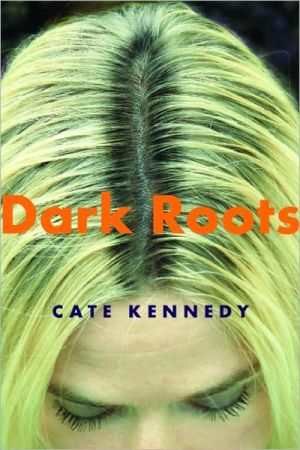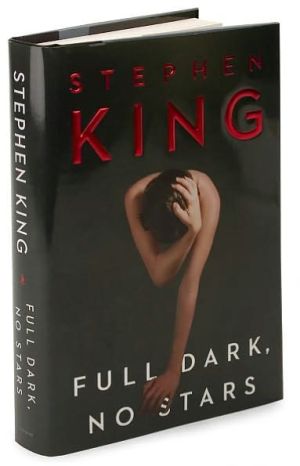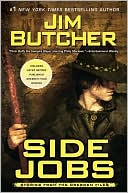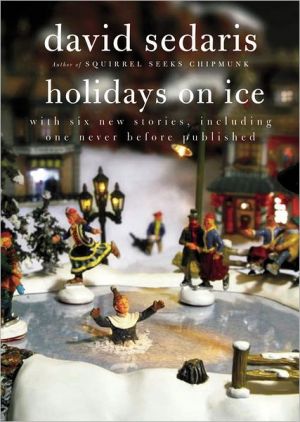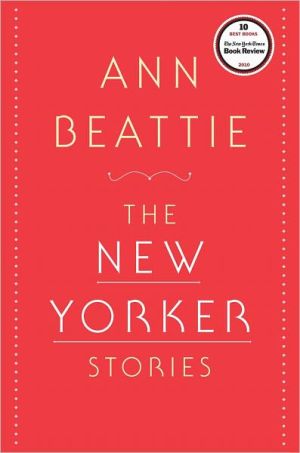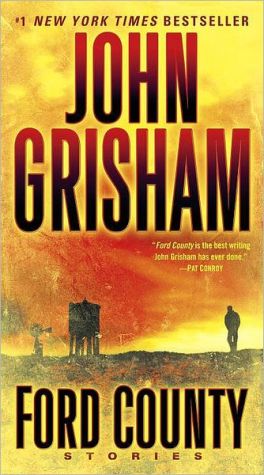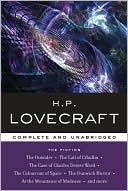Dark Roots: Stories
A collection of prize-winning stories by The New Yorkerdebuted Australian that is “by turns funny, wise, and achingly sad” (Stephanie Bishop, Sydney Morning Herald). Australian Cate Kennedy delivers a mesmerizing story collection that travels to the deepest depths of the human psyche. In these sublimely sophisticated and compulsively readable tales, Kennedy opens up worlds of finely observed detail to explore the collision between simmering inner lives and the cold outside world. Her stories...
Search in google:
A collection of prize-winning stories by The New Yorker–debuted Australian that is “by turns funny, wise, and achingly sad” (Stephanie Bishop, Sydney Morning Herald). Australian Cate Kennedy delivers a mesmerizing story collection that travels to the deepest depths of the human psyche. In these sublimely sophisticated and compulsively readable tales, Kennedy opens up worlds of finely observed detail to explore the collision between simmering inner lives and the cold outside world. Her stories are populated by people on the brink: a woman floundering with her own loss and emotional immobility as her lover lies in a coma; a neglected wife who cannot convince her husband of the truth about his two shamelessly libidinous friends; or a married woman realizes that her too-tight wedding ring isn’t the only thing that’s stuck in her relationship. Each character must make a choice and none is without consequence—even the smallest decisions have the power to destroy or renew, to recover and relinquish. Devastating, evocative, and richly comic, Dark Roots deftly unveils the traumas that incite us to desperate measures and the coincidences that drive our lives. This arresting collection introduces a new master of the short story.The New York Times - Maud NewtonThe stories in Dark Roots, the Australian writer Cate Kennedy's first collection, are melancholy but deliberate and coolly exact. They depict characters in crisis, often so mired in what Walker Percy called the malaise of everydayness that the horror of their condition is invisible to them. Some of the stories culminate in epiphanies; others hinge on a jolt—a violent act or loss.
Cold SnapWhen I go down to check my traps, I see the porch lights at that lady's place are still on, even though it's the morning now. That's an atrocious waste of power, my dad says when I tell him. His breath huffs in the air like he's smoking a cigar. The rabbit carcasses steam when we rip the skin off and it comes away like a glove.Skin the rabbit — that's what my mum used to say when she pulled off my shirt and singlet for a bath. Mr Bailey gives me $3 for every rabbit to feed his dogs. I take them down in the wooden box with a picture of an apple on it. In the butcher's, rabbits are $2.50 but Mr Bailey says he likes mine better. I've got $58 saved. I want to get a bike. Dad reckons it's good to save up your money.Th e tourists who stand around the real-estate agent's window looking serious, pointing, touching each other on the arm, he reckons they're loonies. When the lady up the road bought that house, my dad went over after the sold sign got stuck on and everybody had gone, and he took one of the palings off the side of the house and looked under at the stumps and made a noise like he was holding back a sneeze. Th at lady's a bloody wacker, my dad said. Those stumps are bloody atrocious. He stood there looking at the house and rolled a cigarette. Throwing good money after bad, he said, and kicked the paling. I kicked it, too. After she moved in I didn't set no more snares up there on the hill. I walked on the tracks round the lake, the tracks the rabbits make. I made myself small as a rabbit and moved through them on my soft scrabbly claws. I saw everything diff erent then. Saw the places they sat and rested, the spots where they reached up with their soft noses and ate tiny strips of bark from the bottoms of the river willows. You've got to set a trap so that it kills the rabbit straight off . On the leg is no good. All night the rabbit will cry and twist, then you have to kill them in the morning when their eyes are looking at you, wondering why you did it. Mr Bailey, he tells me he can't believe I can catch them so near the town. I say you just have to watch things and work out where to put the trap, that's all. He nods so small you can only just see his chin moving up and down. You've got it there, Billy, he says. After he gives me the money we look at the dogs and have a cup of tea. His dogs know me and why I come. Their eyes get different when they see me.In the morning, everything is frozen. All up the hill are the trees, and every time I look at them I think of the time in school when I was right and Mr Fry was wrong. He showed us a picture and said trees lose their leaves in autumn and the other kids started writing it down but I felt the words come up, and I said they didn't, they lost their bark. Mr Fry said how typical that the one time I'd opened my mouth in class I'd come up with a wrong answer. I looked at the trees standing bare in the mist and thought about how I'd kept shaking my head when he told me to say I was wrong, and the other kids sitting smiling, staring down at their hands, waiting for after school like the dogs wait for the rabbits. When you smell the leaves, they're like cough lollies, and the bark goes all colours when it's wet. One day I was looking up at them and my eyes went funny and I fl ew up high and looked down at the tops of the trees all bunched together and they looked like the bumpy green material on the armchairs at my Aunty Lorna's place. I never told no one about that, not even my dad. The trees talk loud when it'swindy and soft when it's quiet. I don't know what they talk about, probably about rain. When they get new gum tips, they're so full of sap they shiver in the air. Maybe they're excited. Or frightened. But now that it's winter, the trees just look dark and sunken in, as if they're just hanging on by shutting off their minds, like my grandpop when he had the stroke and Dad said his body was just closing down slowly like something in the winter. And on the track, there's ice crystals on the clay, and when you look real close you can see the crystals are long, growing into lines, and the more mushy the clay the tighter the crystals pack in. They do it in the night, in the cold snap. You can put your foot at the edge of a puddle and just press real gently, and all these little cracks come into it, rushing outwards like tiny creeks. Sometimes there's frost on the rabbits' fur. I brush it off with my hand. Rabbit fur smells nice, like lichen or dry moss. My mum left behind some leather gloves with rabbit fur inside, and when I put them on once I pulled my hot hands out and smelled her smell. What are you bawling for? my dad said. I hid the gloves just under my mattress. When I touch them they feel like a green leaf, just soft and dry and bendy and not knowing autumn's coming. I looked up at the lady's porch lights the morning I got my new hat for my chilblains. Dad made it for me with rabbit skins. He rubbed my ears hard with his jumper and my mouth ached with holding it shut then he pulled the rabbitfur flaps down and tied them. See you back here with the bunnies, he said, squeezing his hands under his arms before he stoked up the chip heater. One day a boy at my school who works at the feed supply told the other kids we were so backward we didn't even have hot and cold running water at our place. He said, It's like Deliverance down there with you-know-who. I asked Dad what deliverance was and he rolled a cigarette and said why. The next time he wanted chook pellets he asked for them to be delivered that day and then he stoked up the chip heater so high that a spray of boiling water gushed up and hit theroof like rain and it sounded like the fancy coffee machine at the milk bar. When this boy came around with the pellets, Dad told him to empty them into the bin and then said would he like to wash the dust off his hands in the kitchen. The boy went in. I stood looking at the chooks and made myself small like them and felt the straw under my claws as I scratched around, and felt how the wheat powdered as I cracked it in my beak, and then there was a scream and the boy came running outside holding his hands out in front of him. And they were bright pink like plastic. As the boy ran past, my dad called, Don't forget to tell your friends. I pushed the rabbits into a hessian bag and heard music coming out of the house with the lights on. It was violin stuff . I saw the lady who'd bought the house come out onto her porch as I cut across the ridge. She was wearing King Gees and you could see the new fold marks in them. She had hair the colour of a fox. When she saw me her face went all bright and excited even though she didn't know me, like the lady doctor who did all those stupid tests on me at school just saying stupid words and expecting me to make up more words and say them straight away and not giving me any time to think it over. She said, Well, hello there, has the cat got your tongue? She had lipstick on. I thought maybe she was on her way tochurch. I said I didn't have a cat and her eyebrows went up. You're up very early on this wintry morning. What's that you've got in your bag? she said, like we were going to play a joke on someone. I showed her the top rabbit's head and her mouth went funny and she said, Oh dear, oh the poor little things. What did you want to kill them for? I said for Mr Bailey. I said they died very quickly and always got the traps right around their necks. She hugged herself with her arms and shook her head and said goodness me, looking at my rabbit-skin hat. I turned my head slowly round so she could see better. She asked me suddenly if I lived in the house down the hill and I said yes. Then she said what a marvellous location and what a shame the power would cost an arm and a leg to put through, otherwise she would have made an off er, and that this little place she'd picked up was such fun and a goldmine. She said all her friends from the city thought she was quite mad but she'd be the one laughing when property values went up and she'd done all the extensions. I was waiting for her to finish so I could go. I could feel the rabbits stiffening up inside their bag; I could smell them. What's your name? she asked me finally and I said Billy. And do you go to school, Billy? I looked at her and said you have to. Her eyes went all crinkly and happy again. And is it a special school, just for special children? I couldn't work her out. Maybe she didn't understand about school. I said not really then my mouth blurted out: You got hair like a fox. She laughed like someone in a movie. Good heavens, she said. You are a character, aren't you? A man in a red dressing-gown came out onto the verandah and the lady said, Look darling, some local colour. Love the hat, said the man to me. I waited for them to tell me their names, but the man just complained that it was bloody freezing, and thank Christ they'd got the central heating in. The lady said yes, the whole place was shaping up well, then she looked out down the track and said, Th e only problem is there's no bloody view of the lake. Then she said, Billy, show Roger your bunnies, darling, and I pulled one out and Roger said, Good God. They both laughed and laughed and Roger said, Well it looks like the light's on but there's no one home. Which was wrong. They were both there and they'd turned the light offby now. When I walked down the track past the sharp turn and through the cutting my boots cracked on the black ice. You can easy go for a sixer on that. People say it's invisible but it's not really. You have to get down real close to see where the water's froze then melted a bit then froze again, all through the night, till it's like a piece of glass from an old bottle. Dad had had his shower by the time I got home. Th e rabbits were harder to skin because more time had passed. The skins ripped off with the sound of a bandaid like they put on your knees in the school sickroom. Get them off, mydad said when I came home one time with the bandaids on. He was watching me so I pulled both of them off fast and they bled again. Call that fi rst aid? That's bloody atrocious, said my dad. Get some air onto them. I looked at my knees. Th ey felt like the hinges inside had got stiff and rusty, like the oil in them had leaked out. Every day for the next few weeks, people drove up the hill to fix things in the house. You could hear banging and machines and then a pointy bit of new roof pushed up over the trees. The lady's friends, the ones who thought she was quite mad, came up a lot at first but then it got colder and they stopped. The lake froze over at the edges and the ducks had frost on their feathers. One day I crept up and saw the lady standing with her arms folded on the new verandah, which was covered in pink paint, just staring out at the trees. All around her garden were piles of rocks and I saw a duck standing still as anything under a tree. I went closer and she saw me. Well, Billy, she called, and I went over and saw the duck was a pretend one. Look at all these bloody trees, she said, sighing. I'm sick of the sight of them. She had on the overalls again but they didn't look so new now. The digger had left big piles of dirt everywhere. What are those trees anyway, Billy? she said suddenly, and I said they were gum trees and she laughed and said she might have guessed that would be my answer, even though I hadn't fi nished and was only sorting out what I was going to say next. I said it was going to be another cold snap that night and more hard weather. And she said how did I know and I started explaining but she wasn't really listening, she was still looking down the gully towards the lake, turning her head like the ladies in the shop when they're buying dresses and looking at themselves in the mirror, deciding. Three weeks after that time I was up in the trees, just listening to them and looking for good spots for snares, when I found the first sick one. When I touched its leaves I knew it was dying, like when I touched my grandpop's hand. It was a big old tree and used to have a big voice but now it was just breathing out. And it was bleeding. All around the trunk there was a circle somebody had cut and sap dripped out which is the tree's blood, my dad says. It was a rough chopping job and the person had used a little saw then a hatchet and I could see how they didn't know how to use the saw properly and had scratched all up and down around the cut. There was nothing I could do for that tree. I wanted to kill it properly so it wouldn't just stand there looking at me trying its hardest to stay alive. The week after that one I found another tree that was the same and then it just kept on happening, seven of the biggest trees got cut. When I looked real hard I fl ew up again and saw them from the top and the dying ones made a kind of line down to the lake all the way from the lady'shouse on the hill to the shore. Then I came back down onto the ground, and I saw how it was. You've done it again, Billy, said Mr Bailey when I came past. I don't know what I'd do without you, two big fat ones today. I got my money and walked up the hill towards the lady'shouse and I saw her through the trees planting something in the garden. Dad said she kept the whole nursery in business. Now I got quite close to her and the pretend duck before she saw me and she jumped backwards. Jesus, kid, just give it a break, will you? she said in an angry voice. I stood there holding the empty box from the rabbits. Just don't creep around so much, Billy, okay? she said, getting up. I saw she had a special little cushion for kneeling on and I was looking at that cushion when she said something else. Where did you get that box, Billy? I said out of the shed. She laughed and looked up at the sky. I looked down at the box with the picture of the apple on it. Out of your shed? That's a finger-joint colonial box, Billy. Do you know how much some of them are worth? Her voice was all excited, like that lady at the school who pretended boring things were interesting on that test. What about selling it to me, she said. I said it was my rabbit box and she said did I have any others in the shed. I said I would have a look. She was a loony. My dad sometimes split up old boxes for the chip heater. He kept nails and bolts in them. I know where there'll be a lot, I said. At the Franklin's garage sale. Her eyes looked a little bit like Mr Bailey's dogs' eyes inside the netting. When is it? she asked. On Sunday. They got lots of stuff. Like what? she said, and then said a whole list of things like fire pokers? ironwork? cupboards? and I just kept nodding. Lots of that kind of thing, I said. Lots of these little boxes with writing and maps of Australia and animals like emus. She folded her arms and looked at me harder. Boxes with emus and kangaroos on them? With joints like this one? Yep, I said, but you got to get there real early in the morning. Like 6.30 or something. 'Cos other people come up from the city. She asked me where Franklin's was, and I told her. I can get there earlier than the dealers, she said, looking down the hill at the row of trees, all secretly dying. On Saturday I set a snare just inside a little tunnel of grass by the lake. Dad says it's bad to kill something without a good reason but I knew the rabbit wouldn't mind. Th e trees were very quiet now. It was going to be a black frost. When the moon came up there was a yellow ring around it like around a Tilley lamp when you take it out on a frosty night. I couldn't hardly get to sleep with thinking. I thought of her going out there with her new saw from the hardware shop and cutting open their skin. In the night, while the rabbits nosed around with their soft whiskery mouths and Mr Bailey's dogs cried and choked on their chains over and over. When I got up it was still dark, as dark as the steel on the monkey bars, cold metal that hurts your chest. I felt a still, cold rabbit's body in the trap and I felt sorry for it. I knew she would, too. Because in the lady's head you can feel sorry and worried for rabbits but not for trees. It looked like it was sitting up there by itself on the track, alive. All the crystals had grown in the night and now the black ice was smooth as glass all round that turn. I got back into bed when I was finished. I felt my mum's gloves. My dad knew I'd got up early when he came to wake me up again. I don't know how. You'd better go out and check your traps, he said as he split the kindling. Up the road Farrelly's tractor was pulling her car out of the ditch. It had crumpled into one of the big gums, and leaves and sticks had been shaken all over it. Mr Farrelly said the ambulance blokes had nearly skidded over themselves on the bloody ice, trying to get in to help. What's a sheila like her doing getting up in the bloody dark on a Sunday morning anyway, Mr Farrelly said as he put the hooks on. Bloody loonies. Under the front wheel I saw white fur, turned inside out like a glove, like my hat. I went down through the trees, touching the sick ones. On the way I stepped in a big patch of nettles. No use crying if you weren't looking out for yourself, my dad says. I looked around and found some dock and rubbed it on and it stopped hurting like magic. That's what nature's like, for everything poisonous there's something nearby to cure it if you just look around. That's what my dad says. I made a little fire and smoked my traps. Five more weeks and I can get a mountain bike.
\ From Barnes & NobleBarnes & Noble Discover Great New Writers\ With a sharp and unerring eye for detail and a gift for magnifying the single moment that awakens realizations and changes lives, Kennedy's stories are like powerful small punches -- artful, compact reminders of the big and little "bads" we witness. Chance encounters, a stroke of good luck, a few words unspoken -- or spoken too freely -- such is the territory this promising Australian writer mines.\ \ A woman watches in anguish as a dear friend in a coma slips further and further away, horrified at her inability to ascertain her friend's important last words, and worrying over them like a tongue with a sore tooth. A young boy who watches his father set things straight treads a similar path when a new neighbor crosses a line. The tight, uncomfortable wedding bands of a married couple prove an apt metaphor for the state of their union. Offended by her hapless husband's boorish companions, a young wife hatches an imaginative plan to get even. While fetching coffee, a woman watches helplessly as a stranger suffers a seizure on the sidewalk and is haunted by the man who stooped to help. These and other stories are the gemlike parts that make up the whole of Dark Roots, an arresting debut where consequences arrive unexpectedly and the simmering inner lives of men and women are no match for the outside world. (Spring 2008 Selection)\ \ \ \ \ Maud NewtonThe stories in Dark Roots, the Australian writer Cate Kennedy's first collection, are melancholy but deliberate and coolly exact. They depict characters in crisis, often so mired in what Walker Percy called the malaise of everydayness that the horror of their condition is invisible to them. Some of the stories culminate in epiphanies; others hinge on a jolt—a violent act or loss.\ —The New York Times\ \ \ Publishers WeeklyCritically acclaimed in Australia, Kennedy made her first stateside splash last year in the New Yorkerand now follows that up with this revelatory collection. Set mostly in unnamed Australian locales, the stories are particularly concerned with the plight of women in social arenas where they're expected to be less than stellar, often for the sake of male egos. "Seizure" chronicles a woman realizing her live-in boyfriend's emotional selfishness after she witnesses a kind stranger aid an epileptic man. "Wheelbarrow Thief" focuses on a beautiful, intelligent publicist who is reduced to a dinner party accessory by her professor boyfriend. And "The Testosterone Club" is a delicious revenge fantasy spearheaded by a wife who has had enough of her husband choosing his buddies over her. Other highlights include "Angel," in which a Vietnamese refugee dissects alienation in Australia while striving to take care of a child. The title story is a vivid dissection of the inner turmoil of a 39-year-old woman dating a 26-year-old-man. And the pièce de résistance? That would be "Soundtrack," an inspired, sublime take on family. Kennedy's prose walks the line between sparse and lush, and she trusts that her readers welcome well-articulated ideas balanced with reassuring doses of mystery. (Feb.)\ Copyright 2007 Reed Business Information\ \ \ \ \ Library JournalKennedy's collage of short fiction deals with how individuals attempt to resolve conflict between their inner selves and their outside worlds. This paperback collection contains many gems. "What Thou and I Did, Till We Loved," the first story and perhaps the best, examines the romance between Rebecca and another woman, Beth, and the decision Rebecca must make as Beth's power of attorney when Beth goes into a coma. The narrative has the potential to be a cliched weepy romance, but Kennedy skillfully turns it into something moving and uniquely described. The title story centers on a middle-aged woman, Mel, who is persistently self-conscious about being the "older woman" after she begins a relationship with a younger man. Kennedy conveys Mel's worries in an endearing, sympathetic manner, which strongly invests the reader in Mel's attempts to eradicate her self-doubt. These 17 stories are alternately moving, romantic, deeply sad, and/or funny, with unexpected twists and satisfying conclusions. Recommended for most libraries.
